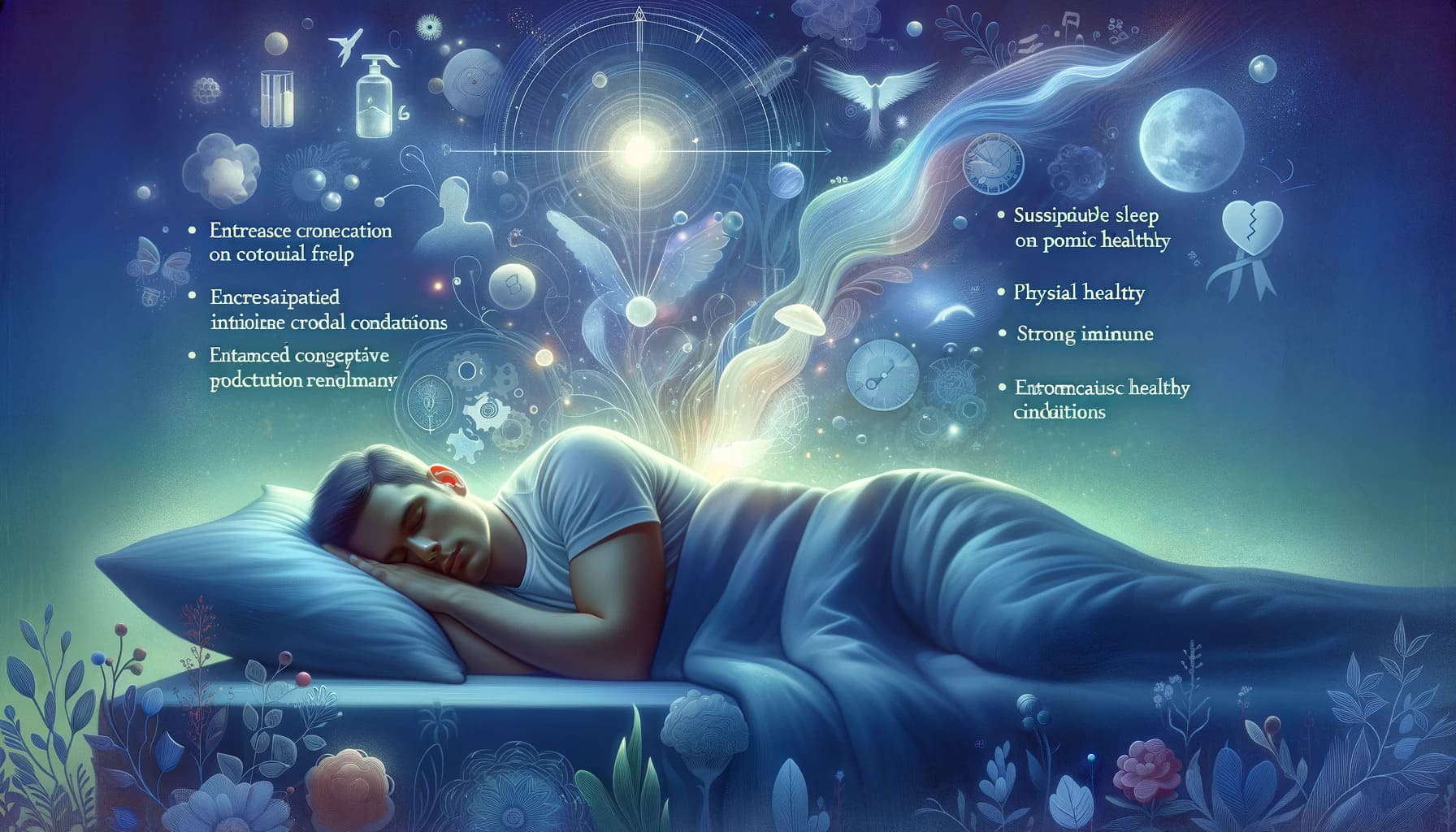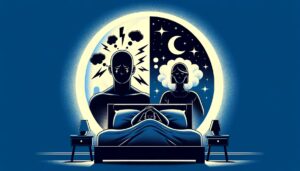Good sleep plays a vital role in your physical recovery and overall well-being. Yet, achieving high-quality sleep can often feel like an elusive goal. This article is here to help you improve your sleep quality with effective strategies. We’ll explore the latest sleep technologies, delve into non-drug therapies like Cognitive Behavioral Therapy for Insomnia (CBT-I), and share practical sleep hygiene practices. Whether you’re battling insomnia or seeking more restorative sleep, these tips can make a significant difference in your nightly rest.
1. Leveraging Advanced Sleep Monitoring Technologies
In today’s tech-savvy world, monitoring your sleep has never been easier. Wearable devices like smartwatches and sleep belts are revolutionizing how you track your sleep patterns. These gadgets use technologies such as actigraphy and heart rate variability (HRV) to provide detailed insights into your nightly rest.
Introduction to Wearable Devices
Wearable sleep trackers have surged in popularity, offering a convenient way to monitor your sleep. Devices like Apple Watch, Fitbit, and specialized sleep belts use actigraphy—which tracks your movements—and HRV to analyze your sleep stages. This data helps you understand when you enter deep sleep or REM sleep, crucial for achieving restorative sleep.
Benefits of Monitoring
Using a sleep tracker, you can gain valuable information about your sleep quality. These devices can identify patterns and highlight areas for improvement. For example, if you notice frequent awakenings, you might explore techniques like mindfulness or adjust your sleep hygiene practices. Additionally, understanding your circadian rhythm can help you optimize your bedtime routine for better sleep consistency.
Limitations and Future Prospects
While wearable sleep trackers offer many benefits, they do have some limitations. Accuracy can vary, especially with devices that rely solely on movement to determine sleep stages. However, advancements are on the horizon. Future wearables are expected to integrate more AI and IoT technologies, enhancing their accuracy and functionality. Imagine your sleep tracker communicating seamlessly with other smart devices to create a holistic view of your sleep environment.
Key Developments in Sleep Technology
Here are some of the latest advancements making sleep tracking more effective:
- Advanced Sleep Algorithms: Enhanced algorithms improve the accuracy of sleep stage detection.
- Integration with AI: Artificial intelligence helps in predicting sleep disorders and providing personalized recommendations.
- Comprehensive Health Metrics: Modern wearables track not just sleep, but also heart rate, oxygen levels, and more, offering a complete picture of your health.
| Feature | Benefit |
|---|---|
| Advanced Sleep Algorithms | More accurate detection of sleep stages |
| AI Integration | Personalized sleep improvement suggestions |
| Comprehensive Health Metrics | Holistic view of your overall health and sleep |
| Increased Comfort and Style | Easier to wear, encouraging consistent use |
Embracing these advanced sleep monitoring technologies can significantly enhance your understanding of sleep quality. By staying informed about the latest tools, you can take proactive steps toward better sleep and overall well-being.
2. Exploring Non-Drug Therapies for Better Sleep
When struggling with insomnia, turning to medication might seem like the easiest fix. However, Cognitive Behavioral Therapy for Insomnia (CBT-I) offers a powerful, non-drug alternative that can lead to lasting improvements in your sleep quality.
Understanding CBT-I
CBT-I focuses on changing the thoughts and behaviors that keep you awake. Unlike medications that only address symptoms, CBT-I tackles the root causes of insomnia. It includes techniques like sleep hygiene education, which helps you create a better sleep environment by optimizing factors like light, noise, and temperature. Additionally, relaxation techniques such as mindfulness and meditation are integrated to reduce stress and promote restorative sleep.
Latest Advancements in CBT-I
Recent advancements have made CBT-I more accessible and effective:
- Digital CBT-I (dCBT-I): Delivered through apps and online platforms, dCBT-I offers flexibility and personalized feedback. This format has proven effective in reducing insomnia severity and improving sleep without the need for frequent in-person sessions.
- Multicomponent Therapy: Combining cognitive, behavioral, and educational strategies, multicomponent CBT-I has shown success rates of up to 80% in improving sleep quality. Typically spanning 6-8 sessions, it includes homework to reinforce new sleep habits.
- Combination Therapy: Studies indicate that pairing dCBT-I with mild sleep medications can enhance long-term sleep quality, providing sustained benefits over time.
Why Choose CBT-I Over Medication?
CBT-I stands out because of its long-term benefits and minimal side effects. Unlike sleep medications, which might only offer temporary relief and can lead to dependency, CBT-I provides durable solutions by addressing underlying sleep disorders. Patients often prefer CBT-I for its holistic approach, which includes healthy lifestyle choices, nutrition and sleep, and understanding your circadian rhythm.
Integrating Additional Non-Drug Techniques
To boost the effectiveness of CBT-I, several non-drug techniques are incorporated:
- Relaxation Training: Practices like yoga and deep breathing exercises help calm your mind before bed.
- Cognitive Strategies: Techniques such as cognitive restructuring help change negative thoughts about sleep.
- Sleep Hygiene Education: Learning about the impact of blue light exposure, exercise and sleep correlation, and sleep supplements can further enhance your sleep quality.
By embracing CBT-I and its integrated methods, you can overcome insomnia and enjoy the benefits of a good night’s sleep without relying on medication.
| Non-Drug Therapy | Benefits |
|---|---|
| Digital CBT-I (dCBT-I) | Increased accessibility and personalized feedback |
| Multicomponent Therapy | High success rates and comprehensive approach |
| Combination Therapy | Enhanced long-term sleep quality |
| Relaxation Techniques | Reduced stress and improved relaxation |
| Cognitive Strategies | Positive mindset towards sleep |
For more on how CBT-I can transform your sleep, visit Sleep Foundation on CBT-I.
3. Enhancing Sleep Hygiene Practices
Maintaining a consistent sleep-wake schedule is a cornerstone of effective sleep hygiene. By going to bed and waking up at the same time every day, you help synchronize your body’s internal clock, known as the circadian rhythm. This alignment not only promotes restorative sleep but also boosts your overall health.
Maintaining a Consistent Sleep-Wake Schedule
A regular sleep schedule helps your body anticipate rest, making it easier to fall asleep and wake up refreshed. Whether it’s a weekday or weekend, sticking to your sleep times reinforces your internal clock, reducing sleep deprivation and improving sleep quality. Adults typically need at least seven hours of sleep each night to function optimally.
Recent Advancements in Understanding Circadian Rhythm Synchronization
Recent research has deepened our understanding of circadian rhythms. A breakthrough blood test called the “time signature” can now diagnose sleep and circadian disorders by analyzing clock genes. This advancement not only aids in treating insomnia and sleep apnea but also links circadian timing to conditions like diabetes and hypertension. Such insights pave the way for cronopharmacotherapy, where medications are timed to align with your internal clock for maximum effectiveness.
Practical Techniques for Establishing and Sustaining a Regular Sleep-Wake Cycle
Implementing a steady sleep schedule might seem challenging, but these practical tips can make it easier:
| Technique | Description |
|---|---|
| Set a Consistent Schedule | Go to bed and wake up at the same time every day, including weekends. |
| Create a Relaxing Bedtime Routine | Engage in activities like reading or meditation an hour before bed to signal your body it’s time to sleep. |
| Control Light Exposure | Get natural light in the morning and dim lights in the evening to regulate your circadian rhythm. Avoid screens at least an hour before bedtime to reduce blue light exposure. |
| Optimize Your Sleep Environment | Keep your bedroom cool, quiet, and dark. Use blackout curtains and maintain a comfortable temperature around 65°F (18°C). |
| Engage in Regular Physical Activity | Exercise daily, but avoid vigorous workouts close to bedtime to prevent overstimulation. |
By integrating these techniques into your daily life, you can enhance your sleep hygiene and enjoy more consistent, high-quality sleep. Remember, small adjustments can lead to significant improvements in how you feel each day. For more tips on maintaining a healthy sleep routine, visit Sleep Foundation.
4. Impact of Diet and Physical Activity on Sleep
Your diet and physical activity levels play significant roles in your sleep quality. Adopting a heart-healthy diet, such as the Mediterranean diet, can lead to more restful nights and better overall health.
How a Mediterranean Diet Enhances Your Sleep
Research shows that following a Mediterranean diet is linked to improved sleep quality and longer sleep duration. This diet emphasizes fruits, vegetables, whole grains, lean proteins, and healthy fats like olive oil. These foods are rich in nutrients that support brain and central nervous system health, which are crucial for restorative sleep.
Key Nutrients for Better Sleep
Certain nutrients found in the Mediterranean diet are especially effective in promoting sleep:
- Omega-3 Fatty Acids: Found in fish, these help regulate your sleep cycle and improve sleep quality.
- Magnesium: Present in leafy greens, nuts, and seeds, magnesium helps relax your muscles and mind.
- Tryptophan: An amino acid in poultry and soybeans, tryptophan increases serotonin levels, aiding in sleep induction.
- Polyphenols: These antioxidants support gut health and regulate the circadian rhythm.
| Nutrient | Food Sources | Sleep Benefit |
|---|---|---|
| Omega-3 Fatty Acids | Salmon, walnuts, flaxseeds | Regulates sleep cycle |
| Magnesium | Spinach, almonds, black beans | Muscle relaxation and stress reduction |
| Tryptophan | Turkey, tofu, pumpkin seeds | Boosts serotonin for better sleep |
| Polyphenols | Berries, dark chocolate | Enhances gut-brain axis and circadian rhythm |
Physical Activity and Sleep Correlation
Regular exercise is another cornerstone of good sleep hygiene. Engaging in physical activity can reduce symptoms of insomnia and enhance deep sleep. However, timing matters—exercising too close to bedtime may increase blue light exposure and adrenaline levels, making it harder to fall asleep. Aim for morning or early afternoon workouts to maximize sleep benefits.
By making healthy lifestyle choices in both diet and exercise, you can significantly improve your sleep quality. Incorporate these practices into your daily routine to enjoy more consistent and restorative sleep.
For more on how nutrition affects your sleep, visit Sleepopolis on Mediterranean Diet and Sleep.
Conclusion
Achieving restorative sleep is a multifaceted journey that combines the latest sleep monitoring technologies, effective non-drug therapies, and solid sleep hygiene practices. By using sleep trackers and embracing advancements in AI-powered sleep technology, you gain valuable insights into your sleep patterns and circadian rhythm. Incorporating Cognitive Behavioral Therapy for Insomnia (CBT-I) and other relaxation techniques helps address sleep disorders like insomnia without relying on medication.
Maintaining a consistent sleep-wake schedule, optimizing your sleep environment, and making healthy lifestyle choices such as balanced nutrition and regular exercise further enhance your sleep quality. These strategies not only reduce sleep deprivation but also promote overall well-being and effective stress management.
Start implementing these approaches today to experience the profound benefits of restorative sleep. Embrace these strategies, transform your bedtime routine, and enjoy healthier, more energized days.







0 Comments